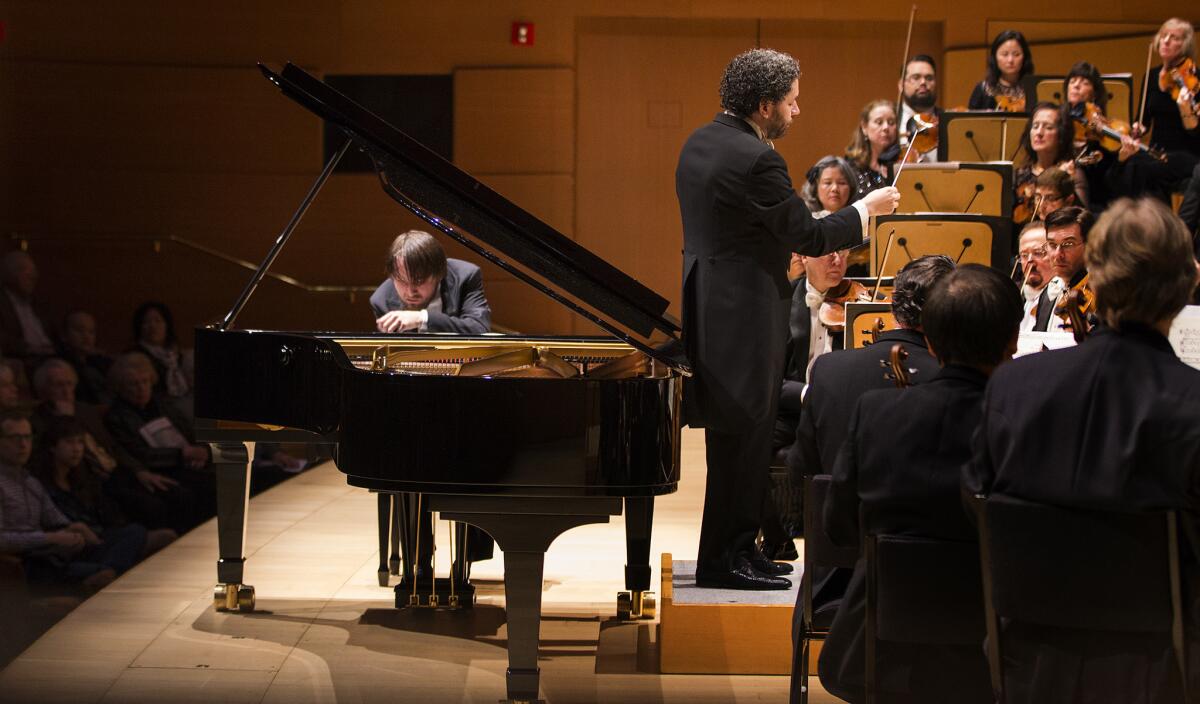Review: Can two sensations make revolutionary music? Conductor Dudamel and pianist Trifonov try to find a spark

- Share via
Popular revolt, whatever the political and social consequences, can — as was the case with the French Revolution and the 1960s student protests — inspire committed music that keeps the revolutionary spirit alive. It can do the opposite, as well, by encouraging nostalgia when the revolution doesn’t turn out so hot, replacing one form of oppression with another.
The confused decade leading up to the 1917 Russian Revolution played out at Walt Disney Concert Hall on Thursday night with this week’s Los Angeles Philharmonic program. For it, Gustavo Dudamel sported a firebrand’s new beard, and the soloist was a 25-year-old Russian sensation, pianist Daniil Trifonov. The parallels are to our own populist uprisings meant to restore, in an insecure time of rapid change, a world no more.
Reactionary Rachmaninoff was the main draw, not only because his Third Piano Concerto remains an audience favorite, a virtuoso showpiece like no other with great tunes, but also because this was the first collaboration between Dudamel and Trifonov, two of the hottest performers in classical music. The rest of the program was revolutionary: Prokofiev’s self-consciously Modernist “Scythian Suite” and Scriabin’s self-indulgently sensual “Poem of Ecstasy.”
The evening’s expectation was for a great “Rach 3,” as the concerto’s fans like to call it. Trifonov is devoted to the composer. Last season the New York Philharmonic built a Rachmaninoff festival around him. He has made a bestselling Rachmaninoff recording, which includes one of his own Rachmaninoff-inspired pieces. Two years ago in Disney Hall, Trifonov joined violinist Gidon Kremer and cellist Giedre Dirvanauskaite in a Rachmaninoff trio I called a performance of a lifetime.
Then there is Dudamel’s relationship with the massive concerto. His recording of it with Yuja Wang and the Simón Bolívar Symphony Orchestra, to my mind, captures the score’s color and electricity with a freshness not found in any other recent account.
Thursday’s soul-searching performance began with Trifonov lost in thought, as though conjuring the opening melody out of thin air. He seemed in his own world and could be barely heard. Dudamel kept out of Trifonov’s way, although not drowning out the ethereal piano proved a challenge.
Trifonov’s tone is beautiful and deep. He is a searcher who can also suddenly explode. His long, thin fingers cover the keyboard with speed and ferocity. Technical challenges do not to faze him. He showed off the extremes of opposing Russian piano schools, from introverted depth to outright banging.
But this is not a concerto that asks for digging. Its surface — the orchestral palate and phenomenal pianistic effects — is what makes it exceptional. A legendary pianist himself, Rachmaninoff played the solo part with an effective near-nonchalance. Horowitz, the work’s greatest exponent, made sparks fly with his brittle percussiveness.
It was hard to tell whether there was much chemistry between Trifonov and Dudamel. The orchestral accompaniment was uncharacteristically murky as the conductor kept out of his soloist’s way. Meanwhile, Trifonov attempted to make Rachmaninoff a composer for all things, blowing up the big, old-fashioned tunes, thundering with the finger-breaking runs and octaves, trying to be modern and conventional at the same time. The playing was, every moment and in every way, impressive, but overly so. Trifonov’s encore was a fluidly played “Fairy Tale,” by Rachmaninoff contemporary Nikolai Medtner.
After intermission, it was Dudamel’s turn to ask too much from the “Scythian Suite” and “Poem of Ecstasy,” but with greater success. In Prokofiev’s case, this suite is all that is left from an unsuccessful 1915 ballet in which the composer hoped to capitalize on the musical barbarity of Stravinsky’s “Rite of Spring” two years earlier. It is Prokofiev’s loudest, most aggressive music, music meant to change the world. It is notorious for driving away audiences (and it succeeded Thursday).
But there are also moments of strange lyricism and just plain instrumental weirdness. Dudamel showed this to be the music of Prokofiev at irreconcilable war with himself, a young composer who wanted to want a musical revolution as a mirror of his scary times but terrified of what it meant and needing to hold on to something of the past.
“Poem of Ecstasy,” a masterpiece of excess and insistence, has no such issues. A solo trumpet, acting like an obsessive cosmic force, does the insisting over and over. (The unfortunate bassoonists sitting in front of the trumpet section kept fiddling with their ear plugs.) Strings are the guardians of sexuality. The winds created a breeze of mystical harmonies.
In a wonderfully over-the-top performance, the revolution started with a ravishment of the senses. (The composer would go on to propose music allied to color, scent and touch.) For this a new order is needed.
As far as I can tell, no one before has used “Poem of Ecstasy” to incite revolt. That’s not the revolution of the spirit that Scriabin exactly had in mind. But after principal trumpet Thomas Hooten’s ever more forceful clarion calls unleashing the power of the full orchestra, organ included, it seemed like any rabble-rousing thing could — and maybe should — happen.
More to Read
The biggest entertainment stories
Get our big stories about Hollywood, film, television, music, arts, culture and more right in your inbox as soon as they publish.
You may occasionally receive promotional content from the Los Angeles Times.











